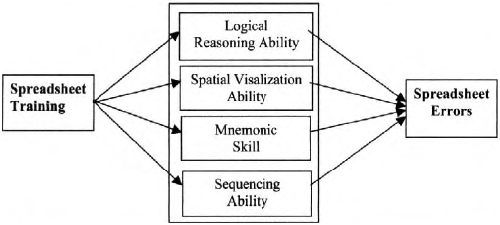Authors
Susan E. Kruck, John J. Maher, & Reza Barkhi
Abstract
It is well documented that electronic spreadsheet models utilized in many professions to enhance decision making frequently contain errors that have negative effects on the ultimate quality of decisions.
Limited research has been published that systematically identifies potential reasons for the causes of these errors, and what procedures can be taken to minimize or eliminate them. Our research provides initial evidence concerning this problem area by investigating how several important cognitive skills are affected by formalized spreadsheet training.
Results indicate that one cognitive skill, logical reasoning, significantly increases after a six-week training period. Importantly, the greater the increase in logical reasoning skill, the more effectively the subject developed competent spreadsheet models.
These findings provide a meaningful step in more perceptibly understanding and defining important cognitive changes that occur in individuals as they undergo formalized spreadsheet development training.
Further extensions of this research should more clearly refine our understanding of the cognitive changes that occur in spreadsheet developers and eventually cultivate the development of more efficient and effective training methods for spreadsheet model designers.
Sample

The framework suggests that spreadsheet training influences cognitive skills (namely logical reasoning, spatial visualization, mnemonic skill, and sequencing skill of end-users) which, in turn, will subsequently influence the error rate in spreadsheet models developed by end-users.
Publication
2003, Journal of End User Computing, Volume 15, Number 1, January-March, pages 20-37
Full article
Framework for cognitive skill acquisition and spreadsheet training
